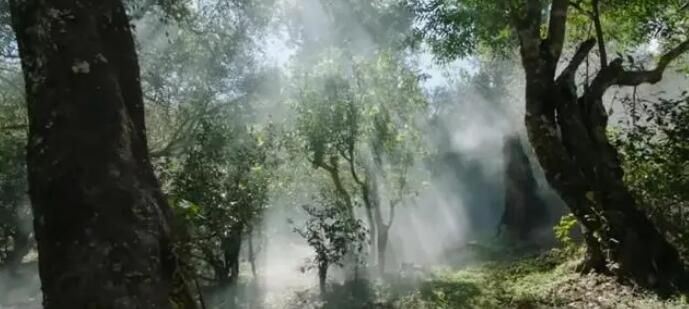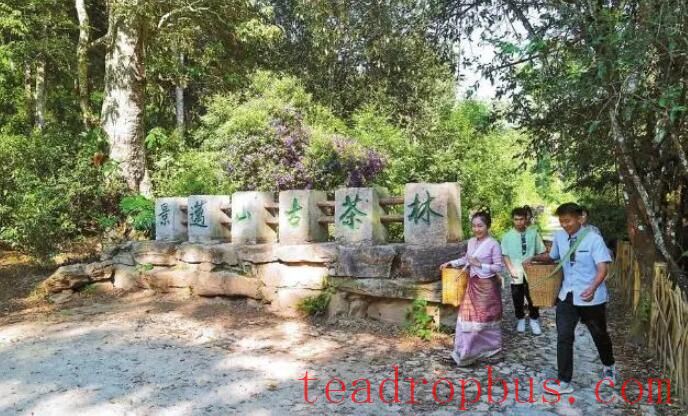A leaf fragrant with aroma has once again captured the world's attention. In the autumn of the year of the Water Rabbit, the central region of the world's Tea tree origin, “World Tea Source” Pu'er, has been further highlighted.

The 45th World Heritage Conference held in Riyadh, the capital of Saudi Arabia, saw the “Ancient Tea Forest Cultural Landscape of Jingmai Mountain in Pu'er” successfully inscribed as a World Heritage Site as China's sole nomination. It became the first global Tea culture heritage site, marking China's 57th and Yunnan Province's 6th World Heritage listing.
China's tea culture spans millennia. From Shennong using tea leaves to neutralize poison to becoming an essential part of daily life, from firewood, rice, oil, salt, soy sauce, vinegar, and tea, drinking tea has become a vital medium for communication in various activities such as hospitality, weddings, apprenticeship ceremonies, festivals, and rituals. Through tea processing, brewing, and tasting, Chinese people have cultivated a peaceful and inclusive mindset, reflecting values of propriety, respect, and humility, which have played a significant role in shaping traditional Chinese culture and national character.
In China's long history, Pu'er tea has been the earliest, longest-standing, and largest in volume as a tribute tea. Perhaps due to its delicious and mellow taste, Pu'er tea was officially recorded as a tribute to the Qing imperial court since the Yongzheng era of the Qing Dynasty. Over the subsequent two hundred years, the value of Pu'er tea skyrocketed.
Whether you are a tea professional, enthusiast, or promoter of tea culture, it is necessary to firmly safeguard the tea cultural heritage left by our ancestors and promote it further. Let Pu'er tea enrich our lives and allow the infinite charm of “Pu'er tea” to be imbued with cultural confidence.
“Tea in the forest, forest in the tea.” The Jingmai Mountain in Pu'er preserves ancient tea gardens that have been cultivated for over a thousand years. The Dai, Bulang, and other indigenous peoples who reside here directly grow tea within the forest, where tea and trees coexist, with trees providing shade for the tea plants, showcasing the ecological wisdom of harmonious coexistence between humans and nature, a practice still used today.

The enduring popularity of Jingmai Mountain tea over hundreds of years can be attributed to the “going with the flow and advancing with the tide,” “coexistence of humans and tea,” and “mountains sharing forests, forests nurturing tea, tea winding around villages” lifestyle of the Dai, Bulang, and other indigenous peoples. This intimate relationship between humans and tea is embodied in Jingmai Mountain tea. As a large-leaf variety, Jingmai Mountain tea contains higher levels of beneficial components like tea polyphenols, theanine, and caffeine than medium and small-leaf varieties, offering clear Health benefits. Its ability to improve with age and maintain its flavor over time makes it even more appealing.
Thus, the successful inscription of the “Ancient Tea Forest Cultural Landscape of Jingmai Mountain in Pu'er” as a World Heritage Site is both a well-deserved recognition and a widely anticipated outcome. Cheers to “Pu'er Jingmai Mountain”!
“The pot holds a vast universe, the cup ages long.” With strong support from the Party and the state, the tea industry of Jingmai Mountain in Pu'er has rapidly developed, with steady improvements in tea science and technology. Tea culture, industry, and science play an increasingly important role in promoting sustainable social, economic, and environmental development. The successful inscription of the Ancient Tea Forest Cultural Landscape of Jingmai Mountain as a World Heritage Site has allowed the fragrance of Jingmai Mountain tea, with a history spanning over 1,840 years, to spread across the globe.
In recent years, Yunnan Province has placed great importance on the protection of intangible cultural heritage, significantly increasing investment in its transmission, achieving fruitful results. The millennium-old Jingmai Mountain, with its continuous “tea protection history,” is a cultural essence passed down through the ages, one of the most brilliant crystallizations of Chinese Tea culture, possessing strong value for transmission and dissemination.
The successful inscription of the Ancient Tea Forest Cultural Landscape of Jingmai Mountain in Pu'er is a promising start. The state and local governments will invest greater efforts and support in protecting and promoting traditional tea-making skills. This success adds another dazzling city card to the birthplace of “Pu'er Jingmai Mountain” tea. Chinese tea culture will gain wider exchange and dissemination through Jingmai Mountain, enabling more people to learn about and love tea, sharing a better life. Perhaps our souls need this cup of Pu'er tea even more than our bodies do. With the successful inscription, we are delighted at this promising start and proud to continue it. We look forward to testing new tea with fresh fire in Pu'er Jingmai Mountain.
Meanwhile, the protection and transmission of the Ancient Tea Forest Cultural Landscape of Jingmai Mountain in Pu'er represent a heavier task for current and future generations. After the successful inscription, Pu'er, as the “World Tea Source,” embarks on a new journey. “What added elegance upon my return? I brew tea before the lamp by the small stove,” the successful inscription marks a new beginning. May the tea culture, a legacy spanning millennia, continue to thrive in the new era, allowing more people to learn about and love tea, sharing the aroma and charm of tea together, enjoying a better life.